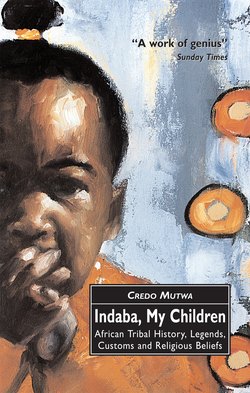Читать книгу Indaba, My Children: African Tribal History, Legends, Customs And Religious Beliefs - Vusamazulu Credo Mutwa - Страница 8
На сайте Литреса книга снята с продажи.
ОглавлениеPROLOGUE
These are the stories that old men and old women tell to boys and girls seated with open mouths around the spark-wreathed fires in the centres of the villages in the dark forests and on the aloe-scented plains of Africa.
Under the gaze of the laughing stars the Old One sits, his kaross wrapped around his age-blasted shoulders, staring with rheumy eyes at the semi-circle of eager expectant faces before him – faces of those who have taken but a few steps along the dark and uncertain footpath called Life – faces of the ones as yet oblivious to the pain of life’s bitter scourges – faces as yet unmarked by furrows of bitterness, ill-health and anger – the fresh, pure, open faces of . . . children.
The fire dances in the middle of the round clay fireplace like a virgin revelling in the simple joy of being alive. It devours the dry twigs and logs that a little girl is constantly feeding it, leaving nothing but glowing ashes. It mocks the silent sky with a redly luminous column of smoke against its starry face and by sending up short-lived stars of its own.
Suddenly the Old One feels a great burden on his shoulders – a heavy responsibility towards the young ones sitting so expectantly around him. Suddenly there is a visible sag to his thin, aged shoulders. He sighs – a harsh, rasping sound – and clears his throat, spitting and blowing his nose into the fire, as his father and his father’s father did before him. And he begins the story – the old, old story which he knows he must repeat exactly as he heard it so long ago, without changing, adding or subtracting a single word: ‘Indaba, My Children, . . .’
It is through these stories that we are able to reconstruct the past of the Bantu of Africa. It is through these stories that intertribal friendship or hatred was kept alive and burning; that the young were told who their ancestors were, who their enemies were and who their friends were. In short, it is these stories that shaped Africa as we know it – years and years ago . . .
True, the Black man of Africa had no mighty scrolls on which to write the history of his land. True, the Black tribes of Africa had no pyramids on which to carve the history of each and every crowned thief and tyrant who ruled them – on which to carve the history of every battle lost and won. But this they did, and still do!
There are men and women, preferably with black birth-marks on either of the palms of their hands, with good memories and a great capacity to remember words and to repeat them exactly as they had heard them spoken. These people were told the history of the Tribes, under oath never to alter, add or subtract any word. Anyone who so much as thought of changing any of the stories of his tribe that he had been told fell immediately under a High Curse which covered him, his children and his children’s children. These tribal story-tellers were called Guardians of the Umlando or Tribal History.
And I, Vusamazulu the Outcast, am proud to be one of these, and here I shall tell these stories to you in the very words of the Guardians who told them to me.
‘Indaba, My Children . . .’
